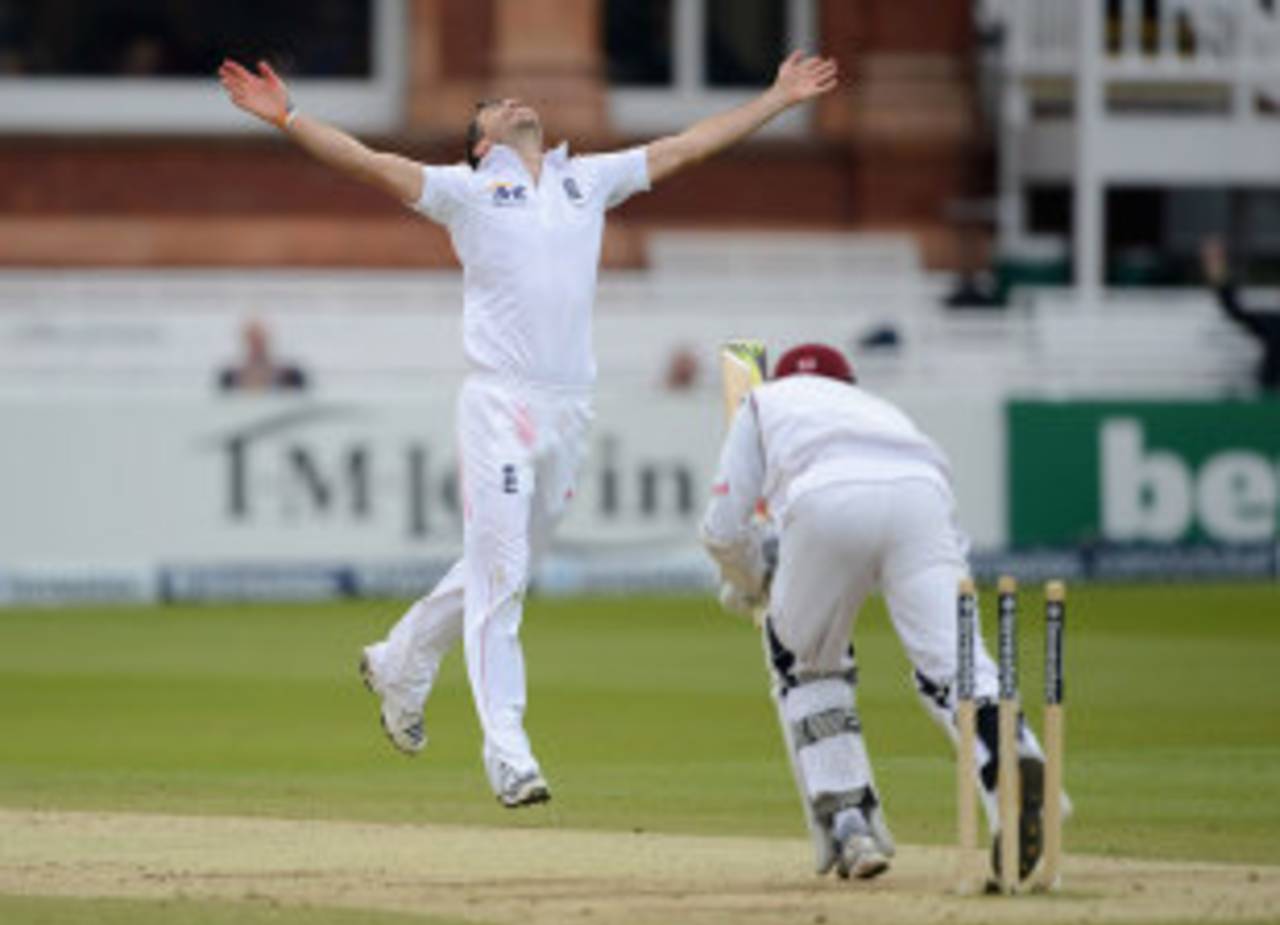In the Test match age of pitch-it-up and swing, England are king. James Anderson is one of the best there has been; Stuart Broad has grown into the idea. Tim Bresnan passed the exam when once upon a time his wide-of-the-crease fast-mediums were only good for the one-day game. In the wings are Graham Onions and Chris Tremlett. Of England's arsenal, only Steve Finn is limited to a shorter length.
With swing bowling comes the edge of the bat and England's slip fielders - usually Andrew Strauss, Graeme Swann and James Anderson - are as convincing as wicketkeeper Matt Prior. Batsmen know this and misjudge at their peril. Improved method and hours of practice have given England an air of superiority over all those who visit these shores. Welcome to fortress England, where the bowlers suffocate, the fielders crow and the batsmen strut. Few England teams can ever have looked so comfortable in their skin.
Ian Bell finished the match with an exquisite on-drive and after a little jig gave the new cap, Jonny Bairstow, one great big hug. The players on the dressing-room balcony stood as one to aplaud themselves. Job done. Phew. Last night they were not so sure. Kemar Roach wound back the West Indian clock to have Strauss caught at slip fending at a fierce short ball. Soon after, nightwatchman James Anderson's glove was brushed by another: 10 for 2 - how Darren Sammy needed another hour on the fourth evening. Passionate cricket comes from confidence. Early on the fifth morning Jonathan Trott was brilliantly held at slip by Sammy off Roach. For a sudden and all-too-brief moment this might have been Viv Richards and Malcolm Marshall in harness, with Greenidge and Haynes, Ambrose and Walsh celebrating the fate of another beaten English batsman. The exuberance, the sheer unbridled joy was the same. The result was not.
England are simply too good for anyone who plays the game predictably. Modern players, coaches and captains talk of "working hard" not of playing intelligently or with more instinct and flair. On the fourth evening Roach and his fellows had 15 minutes to let go and let go they did with nothing to lose. It was fabulous to see but it couldn't last. The fear of failure crushes a team, the legacy of another does it no good. And here am I, talking of Richards and Marshall. How Sammy and co must hate that.
To beat Strauss' team you must think out of the box because he and Andy Flower have prepared them for everything in it. The word professional is often misused, applied to a foul or to meanness, or suggesting dullness. When applied to this England team it means as it should: well-prepared, physically fit, mentally aware (Graham Gooch, now the full-time batting coach loves the phrase: "If you fail to prepare, you prepare to fail.") England have a team that leave little to chance, a team that understand themselves and the conditions under which they play. They have studied the likely responses of an opponent and, therefore, it is only when an opponent surprises that England shiver. Witness the magic in Saeed Ajmal's wrist and fingers; witness Mahela Jayawardene's patience and skill.
Strauss came good at Lord's by limiting his strokeplay and leaving well alone outside off stump. Ian Bell came good by batting within himself. Alastair Cook won the game by giving nothing, not a single sniff, to the West Indies bowlers. To play so efficiently is not as simple as it may appear. Dressing-rooms are fragile, cricketers are prone to error, the game has tiny margins. One ball Kevin Pietersen smashes to the boundary; with the same stroke from the very next he edges to the wicketkeeper. There is so little between cricket succes and failure that millimetres matter.
"England have found the formula that allows individual freedom of expression within the discipline of team performance - you will never walk alone but at times you will have to"
What England have done especially well is find the formula that allows individual freedom of expression within the discipline of team performance - you will never walk alone but, er, at times you will have to. For this juxtaposition to work, players must fully appreciate their own role and the responsibility to others alongside them. And they must make the right choices at key moments, instinctive choices that turn a game. What is high risk to one, say, Cook, is barely the raise of an eyebrow to another, say, Pietersen. Which is why we thrill at watching Pietersen and the madness of it all but barely notice Cook until we study the scoreboard.
Though the contrast between Pietersen and Cook well illustrates England's compass, it is the bowlers who best complete the wider picture. Four hardcore competitors whose inherent weaknesses are covered by the exaggeration of their strengths. The fast men move the ball, the spinner spins it. All bowl with accuracy, patience and courage. If one is off the case, another is on it. West Indies did well to make 343 in their second innings. Last summer, India's array of stellar batting failed to pass 300 once in four test matches.
Five stern days at Lord's has done no harm, only good. Little lapses in concentration made the game tighter than it might have been and, yes, West Indies have real spirit. But England are getting better. That mace is as safe as a slip catch in the hands of the England captain for a while yet.
Former Hampshire batsman Mark Nicholas is the host of Channel 9's cricket coverage
